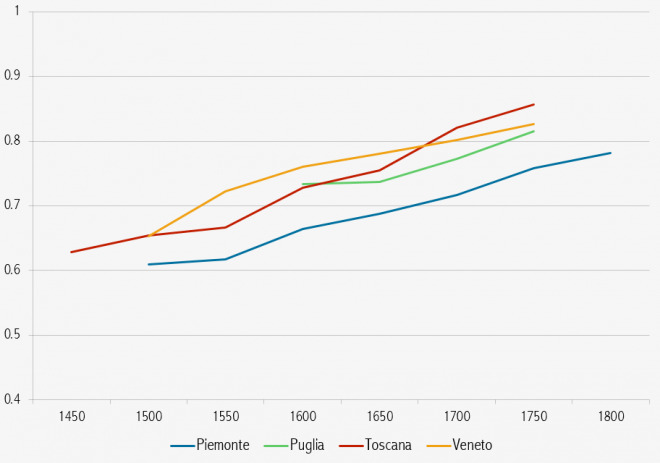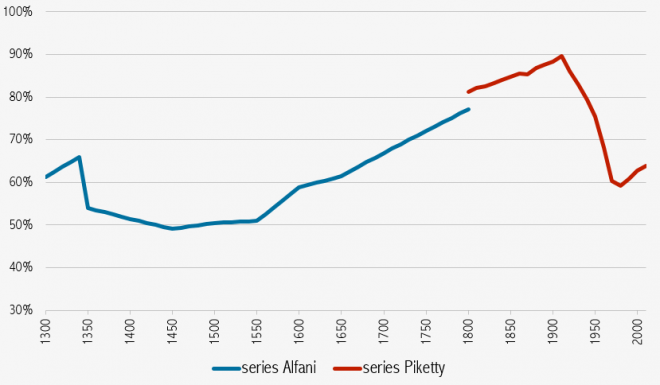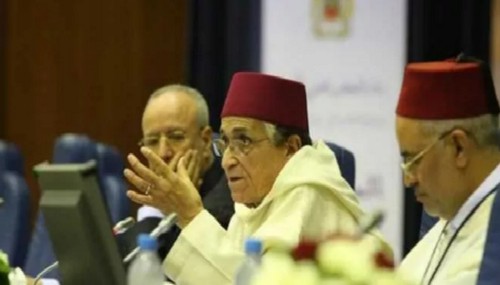La disuguaglianza economica è un tema di grande attualità. Ma quali sono le sue dinamiche di lungo periodo? Tra il 1300 e oggi, la tendenza è stata all’aumento costante. Con due eccezioni: il periodo immediatamente successivo alla peste nera del 1348 e quello compreso tra le due guerre mondiali.
La disuguaglianza nell’Italia preindustriale
Negli ultimi anni, le dinamiche di lungo periodo della disuguaglianza economica sono tornate al centro dell’attenzione. Almeno per alcune aree dell’Europa, possiamo ricostruire l’evoluzione della disuguaglianza a partire dal 1300 circa. In questo ambito, l’Italia svolge un ruolo fondamentale non solo per le eccezionali fonti storiche di cui dispone, ma anche grazie alle attività di un progetto Erc ospitato dall’Università Bocconi: Einite-Economic Inequality across Italy and Europe, 1300-1800.
Il progetto ha già prodotto accurate ricostruzioni per alcune regioni italiane (Piemonte, Veneto, Toscana, Puglia), ciascuna appartenente a un diverso stato preunitario. In tutte queste aree, durante l’età moderna la disuguaglianza economica ha teso a crescere costantemente. Nella figura 1 sono riportati gli indici di Gini della disuguaglianza di ricchezza (0 = perfetta eguaglianza, 1 = perfetta disuguaglianza: un solo individuo o famiglia detiene tutta la ricchezza). Le misure riportate fanno riferimento alla ricchezza, ma nel contesto delle società agrarie preindustriali è difficile immaginare che nel medio-lungo periodo la disuguaglianza di reddito si muova in direzione diversa rispetto a quella di ricchezza, visto che la terra era la principale fonte di reddito.
Figura 1 – La disuguaglianza di ricchezza in Italia, 1450-1800 (indici di Gini)

Fonte: database Einite
È la tendenza della disuguaglianza a crescere ovunque (Einite ha riscontrato una dinamica analoga anche altrove in Europa), più che il suo livello, ciò su cui dobbiamo soffermarci. Si tratta infatti di un risultato non scontato, visto che la sua crescita sembra essersi verificata anche in fasi di ristagno economico – come nel caso dell’Italia del XVII e XVIII secolo.
Mentre in passato gli storici individuavano nella crescita economica l’unico fattore propulsivo della disuguaglianza preindustriale, oggi sappiamo che la situazione è molto più complessa e che dobbiamo tenere in considerazione diverse possibili concause. Ad esempio, perlomeno nel Piemonte sabaudo e nella Repubblica di Venezia, ma probabilmente anche altrove in Europa, la crescita della disuguaglianza in periodi di economia stagnante fu conseguenza dello sviluppo di un sistema fiscale più efficiente e capace di “estrarre” una proporzione maggiore della massima disuguaglianza possibile. Per due ragioni: la natura regressiva dei sistemi fiscali d’antico regime (i poveri erano tassati proporzionalmente più dei ricchi e pertanto la disuguaglianza “post-tax” era superiore a quella “pre-tax”),e gli impieghi a cui erano destinate le maggiori risorse acquisite (guerra, non welfare).
La quota dei più ricchi in Europa dal 1300 a oggi
Se dall’età moderna ci spingiamo ancora più indietro, ai secoli conclusivi del Medioevo, troviamo una situazione diversa. Mentre vi è qualche indizio che tra la fine del XIII e l’inizio del XIV secolo la disuguaglianza stesse già crescendo, la peste nera che colpì l’Europa nel 1347-52 ebbe importanti effetti “egalitari”. Ciò è evidente se guardiamo alla quota di ricchezza detenuta dal 10 per cento più ricco della popolazione (figura 2).
Figura 2 – La quota di ricchezza del 10% più ricco della popolazione in Europa, 1300-2010

Fonte: Alfani, The top rich in Europe in the long run of history, Vox 15 gennaio 2017
La peste nera eliminò metà della popolazione del continente. Dopo l’epidemia, in un contesto di salari reali fortemente crescenti, più ampi strati della popolazione poterono accedere alla proprietà. A ciò contribuì anche la frammentazione dei patrimoni causata da un sistema ereditario di tipo prevalentemente egalitario (sistema che sarebbe stato “corretto” nei secoli successivi proprio come reazione istituzionale alla peste). Sta di fatto, che in tempi molto brevi il 10 per cento più ricco della popolazione perse il controllo del 15-20 per cento della ricchezza complessiva.
Per trovare un altro evento capace di sortire effetti redistributivi altrettanto vistosi, occorre attendere un’altra catastrofe, o per meglio dire la serie di catastrofi compresa tra le due guerre mondiali. Se colleghiamo i dati prodotti da Einite per il 1300-1800 con quelli pubblicati da Thomas Piketty per i due secoli successivi, troviamo una perfetta continuità nel ritmo di accrescimento della disuguaglianza passando dall’età moderna al XIX secolo, e una quasi perfetta coincidenza nei livelli attorno al 1800 (Piketty stima che nel 1810 il 10 per cento più ricco della popolazione europea possedeva l’82 per cento della ricchezza complessiva, mentre le stime Einite indicano il 77 per cento nel 1800). Il vertice fu toccato alla vigilia della prima guerra mondiale, quando il 10 per cento più ricco deteneva il 90 per cento della ricchezza. Al termine della seconda guerra mondiale, la distanza tra ricchi e poveri si era ridotta nettamente e, benché a partire dal 1980 circa la quota di ricchezza dei più ricchi sia tornata a crescere, siamo ancora lontani dalla situazione di inizio XX secolo. In effetti, oggi la quota del 10 per cento più ricco della popolazione europea (64 per cento nel 2010) è analoga a quella tipica della vigilia della peste nera. Vi è senz’altro da sperare che per il futuro sia possibile contenere le disuguaglianze senza l’aiuto di eventi così estremi.

